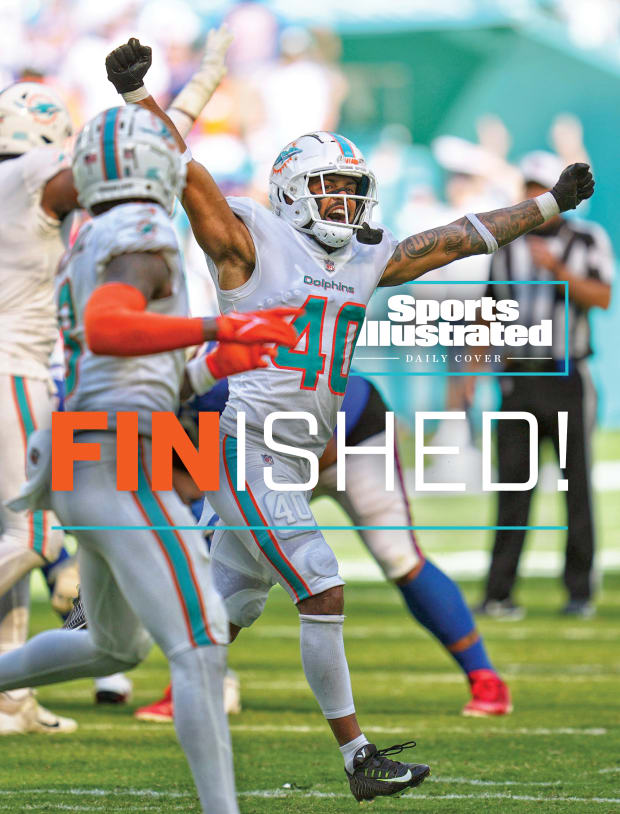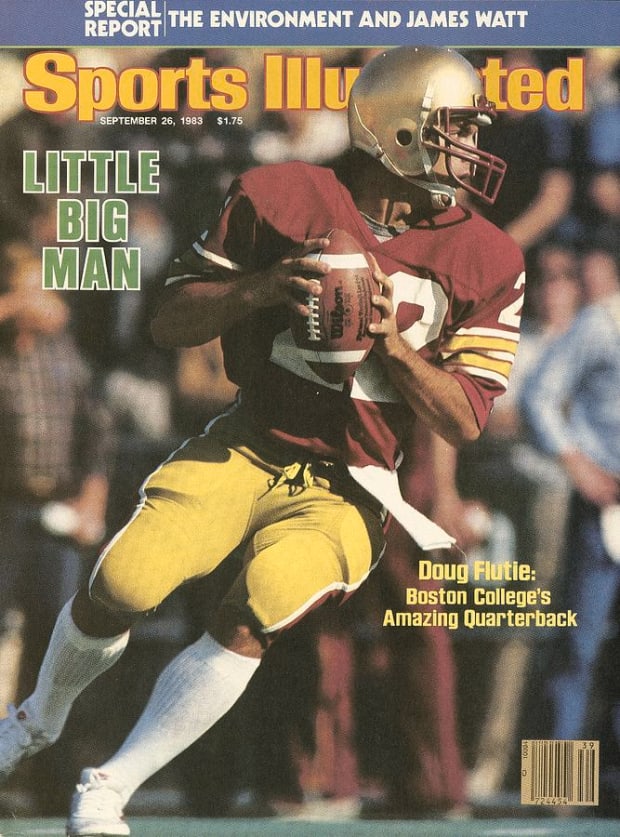It’s time to stop making jokes about the Jags.
Good morning, I’m Dan Gartland. It’s time to stop making jokes about the Jaguars.
In today’s SI:AM:
🐆 Duuuval!
🙅 Field goal drama in Arkansas–A&M
If you're reading this on SI.com, you can sign up to get this free newsletter in your inbox each weekday at SI.com/newsletters.
The Jags are putting last year behind them
With every passing week the NFL’s group of legitimate playoff contenders becomes a little more clear. After a second straight blowout win, this time on the road, it might be time to add the Jaguars to that group.
The Jags went to Los Angeles yesterday and handled the Chargers, 38–10, behind another strong performance from second-year quarterback Trevor Lawrence, who completed 28 of 39 passes for 262 yards and three touchdowns. After a 24–0 pasting of the Colts last week, Jacksonville is 2–1 on the season.
Anything would have been an improvement over last year’s debacle that started under Urban Meyer, but it’s a little jarring to see how quickly the Jags have turned the corner. Going on the road and beating what was supposed to be one of the premier teams in the AFC by four touchdowns is impressive (even if Justin Herbert was hampered by an injury). Doing it after notching a shutout win the week before indicates that it’s not a fluke.
Now, that isn’t to say that the Jags are a flawless Super Bowl contender. They lost to the Commanders in Week 1, 28–22, in a game where Lawrence looked more pedestrian. But they’re achieving success on both sides of the ball, as Conor Orr writes:
Trevor Lawrence throws a football like a generational player. His touchdown pass to Zay Jones in the second quarter showcased almost every reason why he was considered a perfect prospect in one split-second cut-up: mobility, decision-making and a progression scan smoother than the nozzle on a 3-D printer. Mike Caldwell, the team’s defensive coordinator, is leading one of the most efficient rush defense units in the NFL. The Chargers were held to 2.2 yards per carry, with Austin Ekeler gaining only five yards on four carries. They are currently ranked No. 1 in the NFL in opposition rush success rate at 27.8%. For perspective, five NFL teams are allowing a 50% rushing success rate or better by their opponents.
Jacksonville has gained an average of 375.7 yards per game, the sixth-best in the NFL, while holding opponents to 306.7 yards per game, which is eighth-best. Lawrence has looked more like the guy who drew Peyton Manning comparisons at Clemson than the guy who was tied for the NFL lead in interceptions last season. One reason for that is the addition of receiver Christian Kirk, who signed a four-year, $72 million deal in the offseason. He has 267 receiving yards this season (that’s an average of 89 per game), good for eighth in the NFL.
The Jaguars’ hot start is even more compelling given how wide open the AFC appears to be at this point. After the Dolphins and Bills (in that order, after Miami’s big win yesterday), there aren’t many teams in the conference that seem capable of deep playoff runs. The Chargers clearly have issues, especially with Herbert’s injury expected to linger. The Titans have taken a step back. The Broncos can’t get anything going on offense, even after paying a king’s ransom for Russell Wilson. Even the Chiefs looked mortal in a loss to the Colts yesterday. The Jags are right up there with the Ravens, Dolphins and Bills as the AFC teams with the strongest résumés right now.
Suddenly, next week’s Jags-Eagles game becomes a lot more interesting. Not only is it Doug Pederson’s return to Philadelphia, but it’s also a matchup of two teams that seem poised to take the next step.
The best of Sports Illustrated

Jim Rassol/The Palm Beach Post/USA Today Network
Albert Breer’s MMQB is today’s Daily Cover, in which he goes deep on the Dolphins’ big win over the Bills:
So far, so good. Last week, the Dolphins came back from a 35–14 deficit in Baltimore to win 42–38. This week, the result may have been even more dramatic. They outlasted a loaded Bills team that had looked unstoppable through two weeks in a steam room doubling as Hard Rock Stadium. It added to the two wins McDaniel had already registered over Super Bowl–champion coaches and gave Miami sole possession first place in the AFC East heading toward a Thursday-night showdown with the defending conference champion Bengals.
Pat Forde and Ross Dellenger explain how playing in an NFL stadium added some extra drama to Arkansas’s late missed field goal. … The Raiders are the only winless team in the NFL, and Conor Orr writes that it’s fair to have questions about Josh McDaniels and his coaching staff. … Albert Pujols “storming to 700 over the past four months will go down as one of the great mike drops in the game’s history,” Tom Verducci writes.
Around the sports world
Eliud Kipchoge broke his own marathon world record in Berlin. … A skills competition and flag football game will reportedly replace the NFL Pro Bowl. … The NFLPA will reportedly investigate the Dolphins’ handling of Tua Tagovailoa’s return from a head injury. … The Patriots got some worrisome injury news about Mac Jones. … Georgia Tech has reportedly fired football coach Geoff Collins. … Two players got ejected from yesterday’s Royals-Mariners game for some harmless fun after the national anthem. … Here is the latest college football AP Top 25, with Tennessee in the top 10.
The top five...
… things I saw yesterday:
5. James Robinson goes 50 yards, untouched, for a touchdown on fourth-and-1.
4. Tyler Boyd absorbs contact and races for a 56-yard touchdown.
3. DeVonta Smith’s two great catches for the Eagles.
2. Dan Orlovsky’s tweet after Jimmy Garoppolo ran out the back of the end zone for a safety.
1. USA Today Sports photographer Jasen Vinlove’s photo of the “butt punt” in Miami. (Here’s the play itself, which briefly threatened the Dolphins’ upset bid against the Bills.)
SIQ
The Giants and Cowboys will renew their rivalry tonight on Monday Night Football. Which player has the most total passing yards in the history of the series?
- Tony Romo
- Eli Manning
- Troy Aikman
- Phil Simms
Friday’s SIQ: What was the first rule in the 1845 “Knickerbocker Rules,” believed to be the basis for the modern rules of baseball?
- There shall be four bases (including home)
- The inning shall be over when each team makes three outs
- The players must show up on time
- The players must all be men
Answer: The players must show up on time. The exact wording was, “Members must strictly observe the time agreed upon for exercise, and be punctual in their attendance.”
The rules were written down and adopted by the Knickerbocker Base Ball Club, which had been founded by Alexander Cartwright. (You can read them all here.) They describe a game only vaguely similar to the modern game of baseball. Games lasted only seven innings, and each team had only seven players. A batted ball caught after one bounce was an out. There was no such thing as a walk.
For his role as a baseball pioneer, Cartwright was elected to the Hall of Fame in 1938. But the modern understanding of the game’s evolution places a smaller emphasis on Cartwright and the Knickerbocker club.
New York lawyer William Wheaton founded an earlier baseball club in 1837, the Gotham Base Ball Club, and fairly recent revelations indicate that he was the first to codify a set of rules for the game. In 2004, SABR researcher Randall Brown discovered an interview with an unnamed “old pioneer” of baseball that appeared in an 1887 issue of the San Francisco Examiner and describes the origins of baseball. Context clues indicate that the unnamed person quoted in the article is Wheaton. MLB’s official historian, John Thorn, republished the article online in 2012.
From the Vault: Sept. 26, 1983

John Iacono/Sports Illustrated
Long before Kyler Murray and Russell Wilson proved you could be a successful quarterback even if you needed to stand on your tiptoes to reach the top shelf of your locker, there was Doug Flutie.
Flutie, listed at 5' 9", 174 pounds, received only one Division I-A (now FBS) offer, from his hometown Boston College. The Eagles were mediocre at best before Flutie arrived on campus in 1981, going 0–11 in ’78 and 7–4 in ’80. But Flutie helped turn things around. In ’82, BC cracked the AP Top 25 for the first time in six years, and there was some serious buzz surrounding the team in ’83, when SI sent Douglas S. Looney to Chestnut Hill to check in on Flutie Mania:
Season-ticket sales at BC this year totaled some 11,000, compared with about 4,000 for pre-Flutie 1981; also because of the Flutie phenomenon, BC this season has moved its games against Penn State and Alabama from on-campus, 32,000-seat Alumni Stadium to 61,000-seat Sullivan Stadium, the home of the New England Patriots. And BC is now a prime TV attraction; it will play West Virginia this week in an ABC regional game, worth more than $300,000 per school, and on Nov. 25 will appear in a national CBS game against Alabama that will earn the Eagles $600,000. Pre-Flutie, BC’s only significant football connection with television was that the players watched it. Assistant Coach Barry Gallup shakes his head and says, “I’d say what Doug is really good at is magic.”
Flutie’s style of play—reckless or uninhibited, depending on your view—was a major factor in his popularity, but so was his small stature. Looney wrote that he was so scrawny “someone has to open the door to the weight room for him.” Looney also listed, at great length, all of Flutie’s legitimate shortcomings. He was quick to abandon the play that was called in favor of improvisational scrambles. He had poor throwing mechanics and threw too many interceptions. Looney cracked that “you could make a training film of Flutie in action and title it How Not to Play Quarterback.” And yet, Flutie found great success. He wasn’t just the best player in school history. He was making a case as the best player in the history of the region:
But little Flutie is far bigger than merely the best Eagle of all time. He’s on the threshold of being the best New England college football player ever. Disregard those snide remarks that, in view of the scant talent the region has produced, the honor is akin to being first in a one-man parade. Tim Cohane, former sports editor of Look magazine, who now lives near BC, says Flutie is the most exciting player in New England since Albie Booth. Booth, on the off chance he escapes your memory, played halfback for Yale between 1929 and 1931.
And Flutie was just getting started. Looney’s article was published after the third game of his junior season. Flutie would go on to win the Heisman trophy as a senior in 1984, thanks in part to his famous last-second touchdown pass against Miami that inspired the term Hail Mary.
Check out more of SI’s archives and historic images at vault.si.com.
Sports Illustrated may receive compensation for some links to products and services on this website.